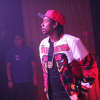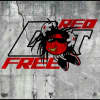The producer is one of the most crucial yet anonymous figures in all of music. Every other week, with Beat Construction, an extension of our column in the magazine, we aim to illuminate the role producers are playing in creating some of our favorite music. For the latest installment we spoke to Atlanta's Burn One. As a mixtape DJ, Burn One helped to launch the careers of Gucci Mane, Young Dro and Yelawolf before evolving into a producer, lacing the likes of ASAP Rocky, Starlito and G-Side with his signature country rap tunes.
You're one of the few rap producers still focused on doing full length collaborations with artists. What's the reasoning behind that approach? I started off in music working at a mom and pop store called Super Sounds in Atlanta, so my whole thought process in making music comes from how I would sell it to somebody. People used to come in the store ands say "Yo what's hot?" and you'd have to tell them, "This is hot" and why. So I try to figure out what those selling points are when I'm making my music. And I think through full lengths I can get my full point across. I can establish a sound, I can give an artist their own vibe and have them stand out, which is really more important than any type of marketing plan. If you look at all the big artists—Snoop and Dre, TI and Toomp, Jay-Z and Just Blaze, there's always been a pairing and I think full lengths are probably the best way to expand upon that. Like SL Jones' Paraphernalia. Somebody like SL has been putting out a bunch of tapes but never really defined his sound and now you can listen to a bunch of the records we did on there and get SL Jones. It puts it in a more concise picture, it narrows the vision and tells the story a little bit cleaner.
Do you ever worry that you're missing opportunities as far as placements by passing so many beats to just one artist at a time? Yeah definitely. That's why more recently I've been trying to find a balance between the two and still try to place major [beats]. I was just out there working with Stalley in upstate New York and a couple other people, so I'm trying to get the placements up. But albums last longer, you're not going to forget [Burn & Starlito's] Renaissance Gangster, but you might forget just a random single that was buzzing at the moment. But it's a double edged sword.
Do you usually try to be physically present in the studio with artists when producing for them? That's when the best music comes out. A lot of rappers don't get the whole process of making beats and all that, they just want the finished product and they want to rap on it but there's something that an artist can bring out of you when they are as into it as you are. With Paraphernalia we did eight records in the first day. SL's energy made me want to do doper beats and work more. Getting in the studio with somebody like Starlito brings out another side of him as well, it just makes for a better a product.
You can't really produce somebody through email. You can send them a beat, but if you don't like the hook when they send it back you can say that but they might've already lived with it and played it a million times. If I was in the studio with them they might say, "Yo I've got this idea for a hook" and I could say like, Uh… maybe not this, try that. But once somebody falls in love with a verse or a hook it's kinda hard to change their opinion.
What type of gear do you use? Right now I'm using Ableton. We sequence everything through Ableton but we pull sounds from Logic and Reason. I've been using a lot of old keyboards, the Rhodes and the Wurlitzer. I'm trying to go with different synthesizers, too, like the MicroKorg and stuff like that, just finding different sounds. I think our whole sound is retro-future, a little old, a little new.
You do use a lot of live instrumentation too, right? I have a production team called Five Points Music Group. It's me, Ricky Fontaine who plays guitar, Walt Live, he produces, and The Professor, who plays bass and produces among other other things. Most of the instruments you hear on the records, all the guitars, all the bass, a lot of shakers and tambourines [are played live]. Whatever we can do, we do it live. We just dropped an EP in January and we finished our second album, called Indeed Face.
What else are you working on at the moment? We're finishing up Scotty's new album, we put out Summer Dreams last year and got a really good response so we're working on the follow up. We're working on Rittz's new album, he just signed with Strange [Music].
Tell me a little about this forthcoming Young Dro tape. We linked back up through my homie and decided to go and do another tape. It's ten songs, I produced two of them. I think at the end of the year we're gonna follow it up with a full project that I'm producing. Dro's another guy who, with the right focus and someone with the right vision behind him, could be amazing. He's a raw talent. We're gonna try to get him re-entered into the different sound that we're coming with, kinda like with Lito's Mental Warfare. I had five songs on there and I'm doing his new album too.
Was convincing artists to give you a look as a producer and not just a DJ a hard sell at first? I wouldn't even play beats for rappers the first year I did them, I would just play them for friends that were around. [A mutual friend] heard some stuff and sent some beats to Starlito, like, "Yo I think you'd be perfect on this." I sent [Lito] like six beats and he rapped on five and then I sent him another five and he finished the tape. That one kinda filled itself. A lot of times a lot of rappers, and I won't say which, they have one certain song in mind that they feel they need to sell to go and do shows and this that and the other. They don't understand that if they do a dope ass album that'll get them way more fans than just having one hot song for four or five months.
It seems like you put a real emphasis on finding talent, which isn't always a role that's associated with producers. I think I find talent better than I actually make music. I guess that comes from that DJ background, the consumer background. It helps to always be a fan, to feel like, oh I'd love to hear him rap over these super slow samples, or whatever type of vibe I'd want to hear a rapper on.
Now when you do a project like that is that purely promotional for both you and the rapper or is there any exchange of money on either side? Certain artists will pay me to do their full project and then other times I'll find an artist I like that I think other people will like and it just makes sense [to do for free]. Like with Rittz. When I met Rittz I was like, damn this dude is dope, and if more people hear him maybe I'll get some money down at the end of the line.
Does that model ever come back to bite you in the ass? All the time! I don't even talk to a lot of the artists I first helped break anymore. I feel like if I had an A&R job when I did some of the stuff I did [more people would acknowledge it]. But because I was a mixtape DJ and they don't understand what that means it gets looked over a little bit. But if I did it with Gucci or whoever else I know I can do it again. And a lot of people have kept in touch, like Yelawolf. I think it all works out how it's supposed to.
Well it does seem like most listeners have no idea what mixtape DJs do. What exactly is your role when you host a tape? Different DJs do different things and it's all on a case-by-case basis. Somebody like Gucci didn't even really know about mixtapes when I first met him. He wasn't happy with his label and I was like, "Yo let's get these songs together, do x, y, z and we can put this out." I picked the songs, I picked the order, I even took the picture for the cover. It's almost like an executive producer role. A lot of times it's not that artists don't have the right songs, it's that they don't know which songs are the right songs. A lot of artists don't have a real perception of their good songs versus their bad songs. They just have songs and they like them all. So it's about picking the right records, putting them in the right order and presenting them in the right way.

